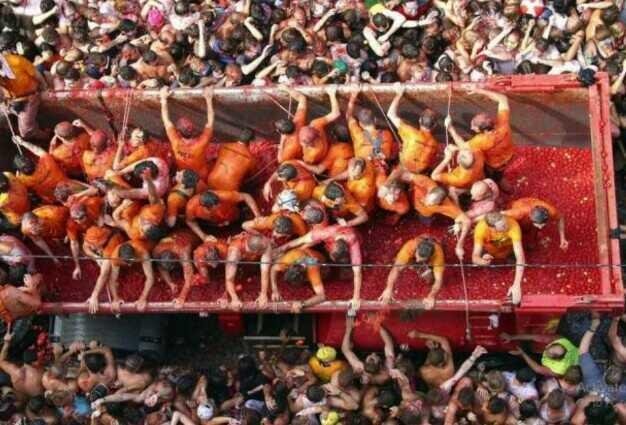Festival La Tomatina in Spanyol
For an hour each year, the small streets of Bunol will be flooded with red, sour, and full of vitamin C. The red color is not blood, but hundreds of tons of tomatoes are thrown by people in different directions. They look happy and enjoy the atmosphere, just like children who are happy to play snow throwing. But this is a tomato.

Quoted from the page nationalgeographic.co.id (accessible 25/02/2018), historical records say if this "tomato war" has been around since the end of World War II, which is also encouraged by the legend and myths that develop about tomatoes. But this festival was also a hiatus in the reign of Francisco Franco in 1939-1975 because it is prohibited. This festival has indeed reap the pros and cons are hard in some circles of society.
Some critics assume that festivals like these are just unhelpful events because they propagate food. Others say the La Tomatina festival is such an insult to the world, when many people in Africa lack food and tomato crises, while Spain is letting the tomatoes (food) go away on pleasure grounds.

Pros and cons continue to exist, but this festival seems to be increasingly becoming and sustainable until now. Quoted from the page kompas.com (accessed 25/02/2018), the contribution provided from the festival reached 300,000 euros (Rp 3.5 billion). With so much economic flow, the Bunol economy was helped, unemployment was reduced, and Spanish revenues from tourists who had come to participate in the festival were equally lucrative.
The tourists come from various countries such as South Korea, Japan, New Zealand, India, to Australia. Pros and cons continue to exist, but this festival seems to be increasingly becoming and sustainable until now. Quoted from the page kompas.com (accessed 25/02/2018), the contribution provided from the festival reached 300,000 euros (Rp 3.5 billion). With so much economic flow, the Bunol economy was helped, unemployment was reduced, and Spanish revenues from tourists who had come to participate in the festival were equally lucrative. The tourists come from various countries such as South Korea, Japan, New Zealand, India, to Australia.

When finished the participants will be rolled water from the hose of fire trucks, and many also went to the river or commercial bathroom. Bunol, as reported by many media is said to be a fertile area and vegetable producer in Spain. But in fact, as quoted from beritagar.id (accessible 25/02/2018), Bunol must import tomatoes to meet the needs of the festival.
The author himself assumes, it would be better if the festival is balanced with efforts to help alleviate the food crisis in various countries through donations from the participants. So not just a fun event alone.